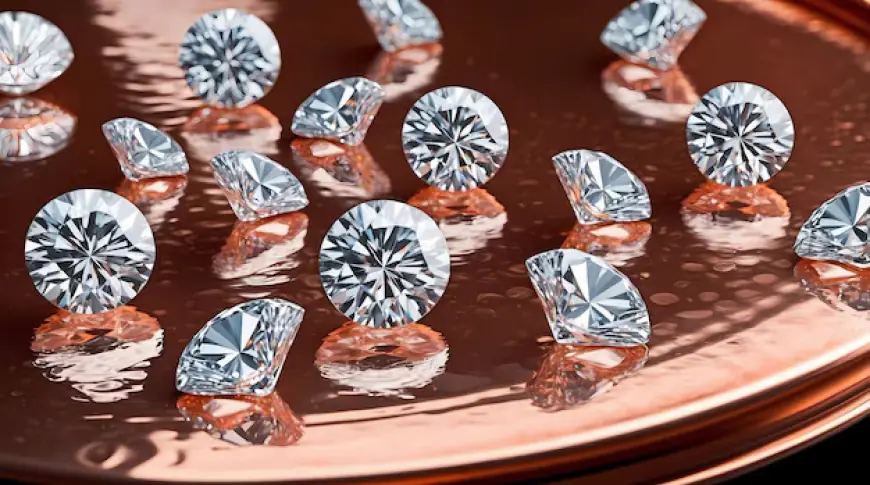Why Ethical Buyers Choose Certified Loose Diamonds?
If you care about quality, ethics, and not overpaying, certified loose diamonds are hands-down the smartest way to buy.

Introduction
Ever walked into a jewelry store, spotted a dazzling diamond, and thought, “Okay, but how do I even know this thing’s real?” That’s where Certified Loose Diamonds come in. They’re basically diamonds with a “report card”—a” document from a trusted lab proving exactly what you’re paying for.
Buying a diamond without certification? It’s kind of like buying a car without checking the VIN number—risky, and honestly, not worth the gamble. Let’s break it down in plain English.
What Are Certified Loose Diamonds?
Certified Loose Diamonds are simply diamonds that haven’t been set into a ring or pendant yet and come with an official grading report. The cool part? You get to see the raw diamond for what it really is—no prongs hiding imperfections, no marketing fluff.
The certificate tells you about the famous 4Cs: cut, color, clarity, and carat weight. But it also adds credibility. When you gift or invest in a certified stone, you’re giving (or getting) peace of mind too.
Why Diamond Certification Matters
Think of Diamond Certification as the diamond’s “truth serum.” It lays out the facts: no guessing, no assumptions. Whether you’re shopping for an engagement ring or an anniversary gift, a certified stone protects you from paying for something that isn’t what it claims to be.
It also makes resale and insurance way easier. No awkward “trust me, it’s real” conversations—just the certificate to back it up.
GIA Certified Diamonds: The Gold Standard
The Gemological Institute of America (GIA) is the big name in diamond grading. When people say “industry standard,” this is what they’re talking about.
GIA Certified Diamonds are known for strict, consistent grading. If a GIA report says the diamond is VS1 clarity, you can trust it’s truly VS1—not a generous estimate. That’s why ethical buyers, jewelers, and even auction houses lean heavily toward GIA stones.
A quick tip: check the laser inscription on the diamond’s edge. It’s tiny, but it matches the certificate and proves you’re holding the same stone that was graded.
AGS Certified Diamonds: For Brilliance Lovers
If you’re someone who notices how light dances in a diamond, AGS Certified Diamonds are worth a look. The American Gem Society is known for its cut grading system—it uses a scale from 0 to 10, and a “0” basically means jaw-dropping sparkle.
AGS and GIA are equally trusted, but AGS often appeals to people obsessed with precision cut quality.
IGI Certified Diamonds: Popular for Lab-Grown Stones
The International Gemological Institute (IGI) grades both natural and lab-grown diamonds. In fact, it’s one of the most common certs you’ll see on lab-created stones.
While some purists prefer GIA or AGS, IGI-certified Diamonds can be a solid choice—especially if you’re going the lab-grown route and want a reputable grading lab without the hefty premium.
Just keep in mind: IGI tends to be a bit looser in grading than GIA or AGS, so always compare stones side by side.
Ethics: Why Certified Diamonds Matter More Than Ever
These days, it’s not just about sparkle—it’s about story. Many buyers want to know where their diamond came from and whether it’s conflict-free. Certified loose diamonds make that conversation easier. Some certificates even state the country of origin, which is huge for people avoiding stones tied to unethical mining practices.
And let’s be honest: diamonds are emotional purchases. When you give someone a certified stone, you’re also giving them confidence in the choice you made. That’s priceless.
How to Double-Check a Diamond’s Certificate?
Quick checklist:
Match the certificate number with the diamond’s laser inscription.
Use the lab’s online verification tool (GIA, AGS, and IGI all have them).
If anything feels off—blurry scans, missing data—ask questions.
No legit seller will mind you taking your time here.
Conclusion
If you care about quality, ethics, and not overpaying, certified loose diamonds are hands-down the smartest way to buy. Whether you lean toward GIA Certified Diamonds for their no-nonsense grading, AGS Certified Diamonds for their sparkle obsession, or IGI Certified Diamonds for lab-grown value, having that certificate changes the whole game.
What's Your Reaction?
 Like
0
Like
0
 Dislike
0
Dislike
0
 Love
0
Love
0
 Funny
0
Funny
0
 Angry
0
Angry
0
 Sad
0
Sad
0
 Wow
0
Wow
0

















































